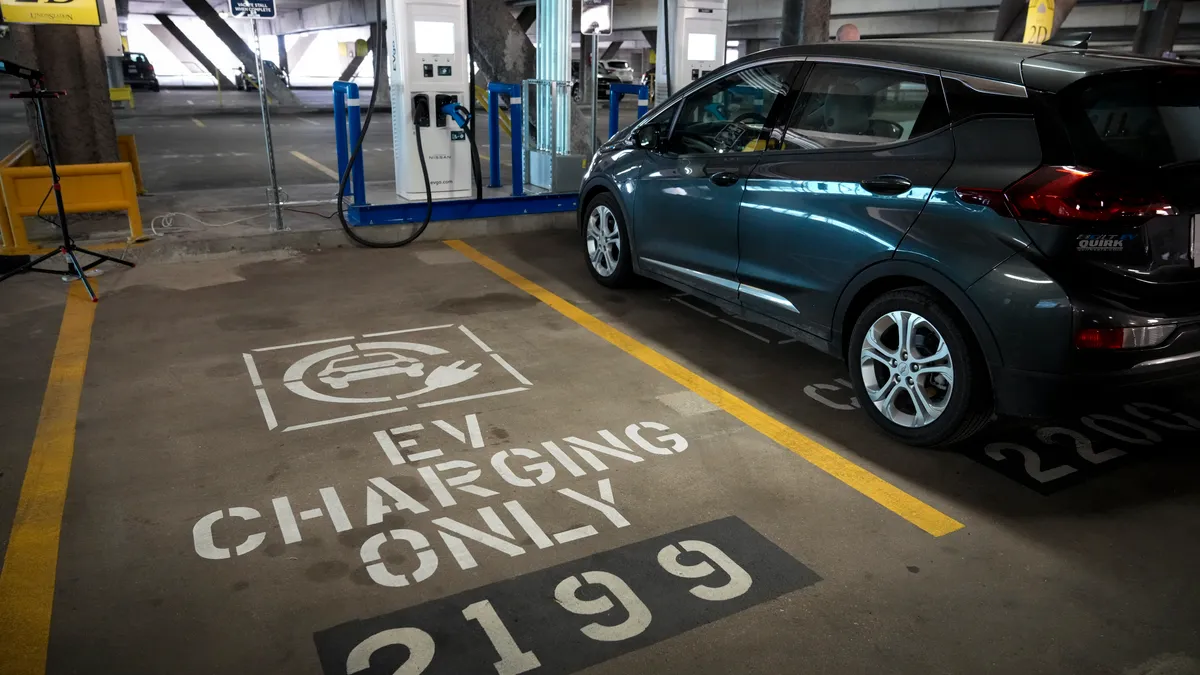Dive Brief:
- New York has begun the process to implement a 2035 ban on new sales of light-duty internal combustion engine vehicles, following the lead of California regulators who adopted such rules in August.
- Gov. Kathy Hochul, D, on Thursday directed the N.Y. Department of Environmental Conservation to develop draft rules requiring a growing percentage of new light-duty vehicle sales to be zero-emission vehicles, beginning with 35% in model year 2026.
- The Clean Air Act allows California to set its own vehicle emission standards, and other states can then follow suit. “That’s the only time we’re letting them go first,” Hochul said in a Thursday press conference. “We’re going to continue making New York state the home of electric vehicle usage.”
Dive Insight:
The transportation sector is responsible for the greatest share of greenhouse gas emissions in New York, as well as nationally, and leaders say the shift to electric vehicles is essential to meeting climate goals.
"With sustained state and federal investments ... we're driving New York's transition to clean transportation forward, and today's announcement will benefit our climate and the health of our communities for generations to come,” Hochul said.
New York expects to receive about $175 million from the federal government over five years to build out charging infrastructure, and officials say that funding is a key part of the state’s plan to reduce greenhouse gas emissions. The federal government has now approved all state plans submitted as part of the National Electric Vehicle Infrastructure formula program, which in total will disburse $5 billion.
New York is working to reduce greenhouse gas emissions 85% from 1990 levels by 2050.
Hochul said the DEC will expedite the regulatory process to implement new clean car rules. En route to a ban on new light-duty internal combustion engine vehicle sales in 2035, New York wants to see 68% EV sales by 2030.
“New pollutant standards for model year 2026 through model year 2034 passenger cars, light-duty trucks, and medium-duty vehicles with internal combustion engines would also be required,” the governor’s office said. “The regulation provides manufacturers with flexibility in meeting the emission requirements and achieving a successful transition to cleaner vehicles.”
EV adoption in the United States has been taking hold rapidly. Electric vehicles were more than 7% of new car sales in July, according to Zpryme, which provides energy research and data. However, EV sales dipped to 6.3% of new car sales in August, marking the first month-to-month decline in EV sales since April, the firm said. Nonetheless, August EV sales in the U.S. were about 62% higher than they were in August 2021.
Boosting sales of EVs in New York may require changing the law around how vehicles are sold, according to the Alliance for Clean Energy New York. The group wants to see lawmakers pass Assembly Bill A4614, which would allow direct sales to the consumer from the vehicle manufacturer.
“To meet the sales requirements in the new Advanced Clean Car II regulations, we need to modernize our state law and expand purchasing options for consumers,” ACENY Director of Policy Analysis and Operations Deb Peck Kelleher said in a statement.
The inability of manufacturers to sell their vehicles directly to the public “as well as the cap on direct sales locations, stifles the EV market,” Environmental Advocates New York said in an analysis of the legislation. The group said the bill would have “substantial benefit.”
“Many EV manufacturers operate on the business model of selling directly to customers without a dealership serving as the middleman, so extending the ability for direct sales will allow EV manufacturers to invest in New York, which will create jobs,” Environmental Advocates said.













